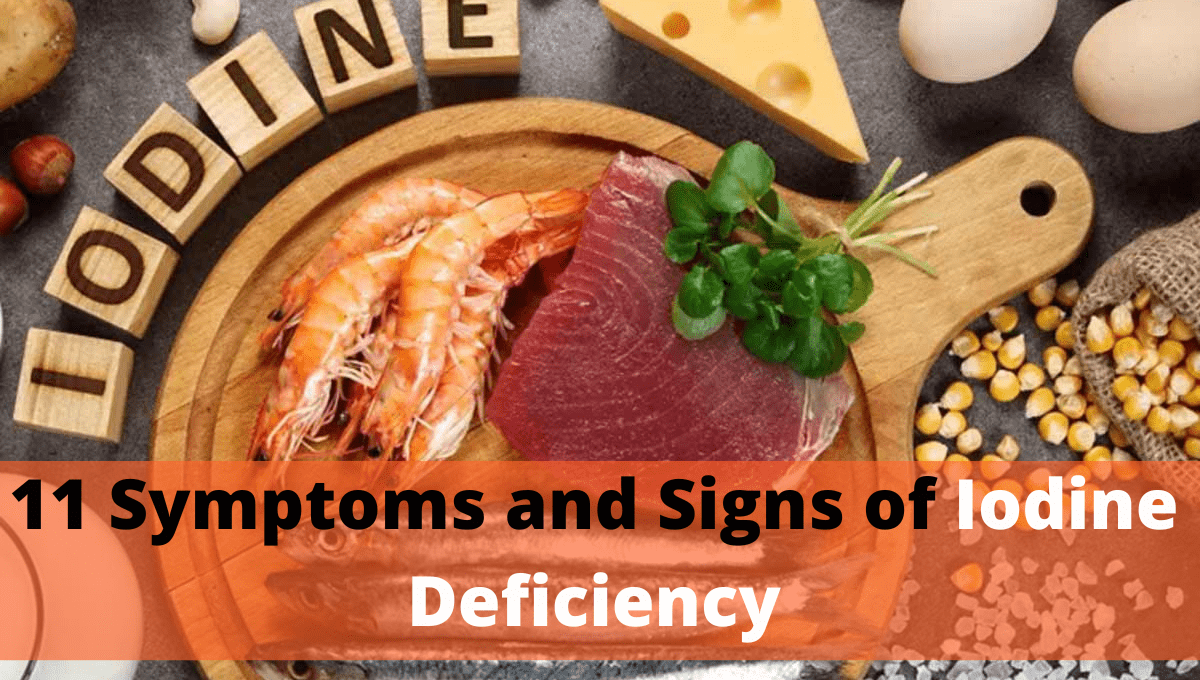To produce a substance called thyroid hormone, your body needs a specific amount of iodine. The thyroid hormone regulates several crucial bodily processes, including metabolism.
Insufficient thyroid function can also result from factors other than low iodine levels.
However, a goitre, or abnormal enlargement of the thyroid gland, as well as other thyroid issues, can be brought on by a shortage of iodine. It may result in mental impairments in youngsters.
Iodine cannot be produced by your body naturally, thus you must consume it through your diet. The normal daily need for adults is 150 micrograms (mcg). Women who are expecting or nursing need 200 mcg each day.
The following list covers 11 iodine deficiency symptoms and signs.
Table of Contents
11 Signs of Iodine Deficiency
A mineral called iodine is necessary for optimum health. But what symptoms of iodine shortage exist, and is it harmful?
Iodine can dissolve in water. Iodized table salt and a few items include it. It is also available for supplementation.
The causes, symptoms, and complications of iodine deficiency are examined in this article. Additionally, it covers potential treatments.
1. Putting on Weight
Unexpected weight gain is one of the most observable symptoms of an iodine shortage.
A person who has a good metabolism burns calories to produce energy. The lack of thyroid hormones in hypothyroidism causes slowed metabolism.
Calories are more likely to be stored as fat when a person’s metabolism slows down, which might result in weight gain.
It’s crucial to keep in mind that weight gain isn’t necessarily an indication of iodine insufficiency. If there is no other explanation for the weight gain, it might merely be a symptom.
Eating more calories than necessary or not exercising enough are two causes of weight gain that are more frequently cited.
2. Swelling in the Neck

The most typical sign of a lack of iodine is swelling in the front of the neck.
When the thyroid gland enlarges too much, this condition is known as a goitre.
A little, butterfly-shaped gland in the front of your neck is the thyroid gland. Upon receiving a signal from the thyroid-stimulating hormone, it produces thyroid hormones (TSH).
The thyroid gland produces thyroid hormones from iodine when blood TSH levels rise. However, if you don’t get enough iodine, your body can’t produce enough of them.
The thyroid gland exerts greater effort in an effort to produce more as a remedy. As a result, the cells expand and proliferate, eventually resulting in a goitre.
3. Feeling Weak
A person with an iodine shortage could experience weakness. Even though lifting heavy goods used to be simple, it may now seem difficult.
A person having less energy than they did explains this frailty. The metabolic rate of a person is slowed by hypothyroidism.
They so use less calories for energy as a result. Muscles cannot function as well when there is a lack of energy. This makes one feel helpless.
4. Feeling Tired

A decrease in metabolic rate also contributes to fatigue. As a result, being exhausted is another indication of an iodine shortage.
Similar to weight increase, being fatigued does not usually indicate iodine deficiency. It is normal to feel exhausted if one is not receiving enough sleep.
Unaccounted for fatigue could be a sign of iodine insufficiency.
5. Losing Hair
The growth of hair follicles is regulated by thyroid hormones.
Your hair follicles may stop rebuilding if your thyroid hormone levels are low. This could eventually lead to hair loss.
As a result, a lack of iodine may also cause hair loss in some individuals.
However, some studies have discovered that those with a familial history of hair loss are the only ones who appear to be affected by low thyroid hormone levels.
If you have thyroid hormone imbalances and have hair loss as a result, consuming enough iodine may help you stop hair loss.
6. Feeling Colder
A common sign of an iodine deficit is feeling cold. In fact, according to some research, more than 80% of those with low thyroid hormone levels may experience unusually high sensitivity to cold temperatures.
Iodine is required for the production of thyroid hormones, hence a lack of iodine might result in abnormally low thyroid hormone levels.
Low thyroid hormone levels may result in a slowed metabolism since thyroid hormones assist regulate this process. Because a slower metabolism produces less heat, you could feel cooler than usual.
7. Changes in Heart Rate
The number of times your heart beats each minute is known as your heart rate.
Your iodine levels might have an impact. If you consume too little or too much of this mineral, your heart may beat more slowly than usual or more quickly than usual.
A heart beat that is unusually slow may result from a severe iodine deficit. You can feel tired, worn out, woozy, and even faint as a result of this.
8. Learning or Memory Problems
The growth of the brain benefits from thyroid hormones. Memory and learning issues may occur from a shortage of these hormones, which may be brought on by an iodine deficiency.
A 2014 study discovered that individuals with low thyroid hormone levels have smaller hippocampi. The area of the brain that impacts memory is called the hippocampus.
9. Pregnancy Complications

Iodine deficiency is a serious danger for pregnant women. This is due to the fact that they must eat enough to cover both their own daily demands and those of their developing child.
Since babies consume iodine through breast milk, the increased demand for iodine lasts the duration of lactation.
Iodine deficiency during pregnancy and lactation can have negative effects on both the mother and the foetus.
Goiter, weakness, weariness, and a cold feeling are some of underactive thyroid symptoms that mothers may encounter. Infants who are iodine deficient may experience slowed physical and mental development.
10. Heavy or Irregular Periods
The hormone levels that control a woman’s period can be impacted by low thyroid hormone levels. Iodine deficiencies may manifest as any of the following symptoms:
- heavier than typical menstrual cycles
- times that be either longer or shorter than normal
11. Drying Skin
Iodine shortage can cause dry, flaky skin, which might be a symptom of hypothyroidism.
Cell renewal is aided by thyroid hormones. Lack of these hormones may lead to an accumulation of dead skin cells, which can occasionally cause dry, flaky skin.
Sources of Iodine
In the diet, there aren’t many reliable sources of iodine. This is one of the main causes of iodine deficiency in the world.
The daily recommended intake (RDI) is 150 mcg. The demands of 97-98% of all healthy persons should be met by this quantity.
Women who are expecting or nursing, however, require more. Women who are pregnant need 220 mcg per day, whereas breastfeeding women need 290 mcg per day.
Excellent sources of iodine are the foods listed below.
- Cod, 3 ounces (85 grams): 66% of the RDI
- Iodized salt, 1/4 teaspoon (1.5 grams): 47% of the RDI
- Egg, 1 large: 16% of the RDI
- Dried prunes, 5 prunes: 9% of the RDI
- Tuna, canned, 3 ounces (85 grams): 11% of the RDI
- Shrimp, 3 ounces (85 grams): 23% of the RDI
- Seaweed, one whole sheet dried: 11–1,989% of the RDI
Iodine can vary greatly depending on where the seaweed was harvested. Iodine is abundant in seaweed from certain nations, including Japan.
Numerous additional foods, including fish, shellfish, beef, poultry, lima and pinto beans, milk and other dairy items, include smaller levels of this mineral.
The easiest way to ensure that you consume adequate iodine is to season your food with iodized salt. For the duration of the day, a half-teaspoon (3 grammes) is sufficient to prevent a shortage.
How Do You Test for Iodine Deficiency?
If your doctor thinks you may be iodine deficient, they will typically do one of four tests to determine your iodine levels:
- Urine Test: The easiest and quickest test is this one. Results can be obtained in a matter of minutes, although it isn’t as precise as some other iodine tests.
- Blood Test: Iodine levels in the body can be determined with this quick and reliable test. In contrast to a urine test, it takes longer to read.
- Iodine Loading Test: The amount of iodine your body excretes in urine over the course of a day is determined by this test. It’s not the quickest test, and it’s also not the most practical. (You must collect all of your urine samples within a 24-hour window.) But it’s actually extremely true.
- Iodine Patch Test: In the iodine patch test, your skin is painted with iodine and the results are evaluated 24 hours later. The patch wears off within 24 hours in people who are not iodine deficient. Iodine will, however, probably be absorbed into the skin more quickly if there is a deficit. Although not the most precise test available, it is affordable and takes only a short while.
Conclusion
Particularly in Europe and Third World nations, where the land and food supply have low iodine levels, iodine shortages are highly prevalent.
Iodine is used by your body to create thyroid hormones. Because of this, hypothyroidism, a condition in which the body produces insufficient thyroid hormones, can result from an iodine deficit.
Fortunately, deficiency is simple to avoid. You should be able to fulfil your needs by sprinkling a little iodized salt on top of your main meals.
It’s recommended to consult your physician if you suspect you may be iodine deficient. They will either take a urine sample or look for outward indications of iodine shortage, such as a goitre.
Frequently Asked Questions
What Will Happen If You Lack of Iodine in Your Body?
Having a significant iodine shortage might cause hypothyroidism. Heart disease and related conditions including an enlarged heart and heart failure are examples of complications.
Cognitive impairment and depression are examples of mental health problems.
What Vegetables are High in Iodine?
They can be found in soy and cruciferous vegetables like cabbage, broccoli, cauliflower, and brussels sprouts as well as various plant meals.
Eating moderate amounts of foods containing goitrogens is not a problem for the majority of Americans who consume enough iodine.
How Can I Get Enough Iodine?
Although the amount per serving varies based on the variety you eat, seaweed can be a fantastic source. Eggs, dairy products like milk, yoghurt, and cheese, as well as seafood like shrimp, tuna, and cod, all contain iodine. Foods like salt that are marked “iodized” have had iodine added to them.
Sources:
- https://www.ncbi.nlm.nih.gov/books/NBK278958/
- https://www.ncbi.nlm.nih.gov/pubmedhealth/PMHT0022083/
- https://pubmed.ncbi.nlm.nih.gov/10792210/
- https://www.ncbi.nlm.nih.gov/pmc/articles/PMC2634852/
- https://www.ncbi.nlm.nih.gov/pmc/articles/PMC2895281/
- https://www.nejm.org/doi/full/10.1056/NEJM200003093421006
- https://www.ncbi.nlm.nih.gov/books/NBK279005/
- https://pubmed.ncbi.nlm.nih.gov/24205791/
- https://pubmed.ncbi.nlm.nih.gov/22742605/
